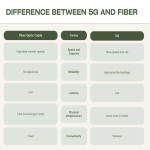
Broadband Vs WiFi
"Dive into the intricacies of internet connectivity: Broadband, the wired data lifeline, and Wi-Fi, the wireless bridge. Understand their roles, from delivering high-capacity data to seamless device connections, while considering the nuances of speed differentials."

Fiber Internet vs Satellite Internet
Fiber internet and satellite internet are two distinct types of broadband services that offer contrasting approaches to delivering data to users. Here, we explore the primary differences between the two: **Speed:** One of the most notable distinctions between fiber and satellite internet lies in their speed capabilities. Fiber internet boasts impressive speeds, reaching up to 1 Gbps. This is made possible because it transmits data through fiber optic connections using light pulses, a highly efficient and reliable method. On the other hand, satellite internet generally lags behind in terms of speed, offering a range from 12 Mbps to 100 Mbps. The reliance on radio waves to send and receive data from orbiting satellites can introduce delays or latency issues. **Availability:** Satellite internet holds a significant advantage in terms of availability, as it can be accessed almost anywhere on Earth. This is possible due to the coverage provided by satellites in geostationary orbit, which can span vast distances like entire continents or oceans. Conversely, fiber internet requires a physical connection to a fiber optic network, and while it has been expanding its reach, there are still regions, especially rural or distant areas, where it may not be accessible. **Reliability:** When it comes to reliability, fiber internet tends to hold the upper hand. Its infrastructure, often buried underground or mounted on utility poles, is better shielded from external factors such as weather, interference, or congestion. In contrast, satellite internet is more susceptible to environmental disruptions like rain, snow, wind, or cloud cover, which can interfere with the signal and lead to outages or delays. Additionally, network congestion can impact satellite internet, particularly when numerous users share the same bandwidth. **Cost:** Cost considerations also play a role in choosing between fiber and satellite internet. Satellite internet tends to be more expensive, especially for high-speed or unlimited plans, and users may also need to bear installation, equipment, and maintenance costs for satellite dishes and modems. Fiber internet, depending on the provider and plan, may be either less expensive or comparable in price. It may also offer better value for money with faster speeds and lower latency. In conclusion, while satellite internet provides wider coverage and is a viable option for remote locations, fiber internet shines in terms of speed, reliability, and potential cost savings. As the availability of fiber internet continues to expand, more users are finding it to be an attractive and efficient choice for their broadband needs.

Is fibernet better than broadband
In this article, we delve into the intriguing world of internet connectivity, exploring the contrasting realms of fibernet and broadband. Unraveling the intricacies of these technologies, we present a comprehensive comparison of their speed, reliability, and suitability for different users. Whether you're a tech-savvy user seeking ultra-fast connections or a household looking for a reliable online experience, our in-depth analysis will guide you in making the right choice. Join us on this enlightening journey to understand the key differences between fibernet and broadband, ensuring you embark on a seamless and rewarding internet experience.




